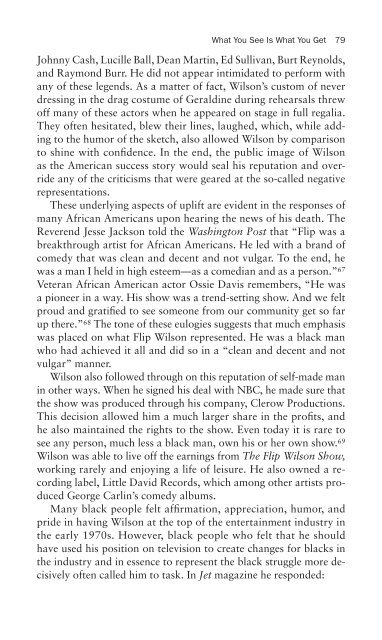Revolution Televised.pdf
Revolution Televised.pdf
Revolution Televised.pdf
You also want an ePaper? Increase the reach of your titles
YUMPU automatically turns print PDFs into web optimized ePapers that Google loves.
What You See Is What You Get 79<br />
Johnny Cash, Lucille Ball, Dean Martin, Ed Sullivan, Burt Reynolds,<br />
and Raymond Burr. He did not appear intimidated to perform with<br />
any of these legends. As a matter of fact, Wilson’s custom of never<br />
dressing in the drag costume of Geraldine during rehearsals threw<br />
off many of these actors when he appeared on stage in full regalia.<br />
They often hesitated, blew their lines, laughed, which, while adding<br />
to the humor of the sketch, also allowed Wilson by comparison<br />
to shine with confidence. In the end, the public image of Wilson<br />
as the American success story would seal his reputation and override<br />
any of the criticisms that were geared at the so-called negative<br />
representations.<br />
These underlying aspects of uplift are evident in the responses of<br />
many African Americans upon hearing the news of his death. The<br />
Reverend Jesse Jackson told the Washington Post that “Flip was a<br />
breakthrough artist for African Americans. He led with a brand of<br />
comedy that was clean and decent and not vulgar. To the end, he<br />
was a man I held in high esteem—as a comedian and as a person.” 67<br />
Veteran African American actor Ossie Davis remembers, “He was<br />
a pioneer in a way. His show was a trend-setting show. And we felt<br />
proud and gratified to see someone from our community get so far<br />
up there.” 68 The tone of these eulogies suggests that much emphasis<br />
was placed on what Flip Wilson represented. He was a black man<br />
who had achieved it all and did so in a “clean and decent and not<br />
vulgar” manner.<br />
Wilson also followed through on this reputation of self-made man<br />
in other ways. When he signed his deal with NBC, he made sure that<br />
the show was produced through his company, Clerow Productions.<br />
This decision allowed him a much larger share in the profits, and<br />
he also maintained the rights to the show. Even today it is rare to<br />
see any person, much less a black man, own his or her own show. 69<br />
Wilson was able to live off the earnings from The Flip Wilson Show,<br />
working rarely and enjoying a life of leisure. He also owned a recording<br />
label, Little David Records, which among other artists produced<br />
George Carlin’s comedy albums.<br />
Many black people felt affirmation, appreciation, humor, and<br />
pride in having Wilson at the top of the entertainment industry in<br />
the early 1970s. However, black people who felt that he should<br />
have used his position on television to create changes for blacks in<br />
the industry and in essence to represent the black struggle more decisively<br />
often called him to task. In Jet magazine he responded:

















